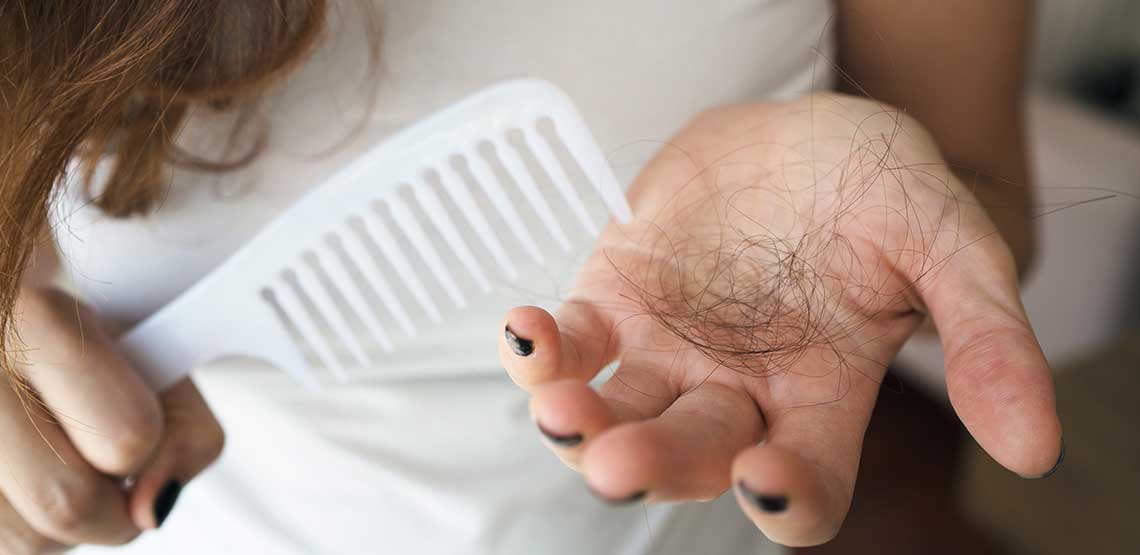What Causes Hair Loss in Women?
A women’s hair has been called her crowning glory, so it’s understandingly stressful when hair loss occurs.
Some hair loss is totally normal; in fact, the average rate of hair loss is about 50–100 hairs per day. This may sound like a lot, but the hair is replaced by new growth.
However, there are many reasons your rate of hair loss may increase, which you might observe by the extra hair in your comb, on your pillow when you wake up, or clogging your drain.
While hair loss can be stressful and upsetting, it’s actually quite common in women as well as in men, and can happen for a number of reasons. If you've ever wondered what causes hair loss in women, keep reading to learn more.
Types and Patterns of Hair Loss
Some types of hair loss in women are treatable and acute (meaning you can expect the hair loss to subside), whereas some forms are more chronic or linked to deeper underlying health issues.
In both women and men, hair loss can occur in a variety of patterns: bald patches emerging, hair loss being more centralized at the top of the head, or hair suddenly falling out from all over the scalp in a random pattern.
Common Causes of Hair Loss
Regardless of the type of hair loss you experience, it’s likely an indication of something else happening in your body; our physical body is always a direct reflection of our internal health.
Here are a few of the most common causes of hair loss.
Hormones
Our hormones control so many mechanisms in our bodies, including hair loss and growth. Things that can alter hormones and thus cause hair loss include pregnancy, childbirth, or menopause. When these periods of time are over, hair loss will likely subside, so hormonal issues usually just cause temporary hair loss.
Changes in Weight
If your body has recently undergone dramatic weight loss such as after weight loss surgery or during an intense period of dieting or exercise, you may see a side effect of this in your hair. When our caloric intake gets low, our bodies don’t have the extra fuel needed to support hair growth.
Medications
Many common medications used to treat a wide variety of ailments, or even routine medication such as birth control, list hair loss as a side effect. Anything from heart medication, arthritis medication, and many others can cause changes in the body that result in increased hair loss, so check the side effects if you notice a sudden increase in hair loss.
Stress
We all know of the far-reaching effects stress has on our health, but did you know hair loss was included on that list? If you’ve gone through a traumatic event, are grieving a loss, dealing with work headaches, or even the stress of a big move, this could be the culprit for your increased hair loss. Luckily, as the stress subsides, so should the hair loss.
Vitamin Deficiencies or Illnesses
Another reason to take your vitamins (or get them naturally from food): healthy hair. A lack of certain vitamins can cause hair breakage and loss. If your diet isn’t what it should be, this is a good place to start, as the health of your hair certainly reflects your internal health.
Genetics
Hereditary baldness is more often talked about as a man’s issue, but women can experience balding too thanks to genetics. If your mom, aunts, grandmas, or other women in your family experience balding (which typically occurs in your 50s and 60s, but can happen sooner), it’s likely in your DNA to experience hair loss.
Thyroid Issues
If your thyroid hormones aren’t producing at the normal rate, you can have either hyperthyroidism or hypothyroidism, both of which can play a roll in our hair health. Hyperthyroidism causes hair thinning on the scalp and hypothyroidism often causes hair to thin and fall out, not just on the scalp, but anywhere on the body. Luckily, with proper treatment for your thyroid, your hair loss should stabilize as your thyroid levels do.
Other less common reasons for hair loss in women include damage caused by certain hairstyles that pull or damage hair, over-washing or styling with heat, or even repeatedly twisting or pulling your hair. Another cause is if you’re undergoing chemotherapy, which is well known for causing hair loss.
Options for Treatment
In many causes, increased hair loss is temporary and will stabilize with time and improved health. However, it doesn’t hurt to make sure to get to the bottom of the issue by visiting a doctor or even a nutritionist, since hair loss can be indicative of many underlying (and treatable) health woes.
For example, if your thyroid hormones are out of whack or you’re deficient in a vitamin, supplements and medication will clear up the issue quickly, and the hair loss may be the first sign that something is amiss.
If none of the above reasons are likely to be the culprit for your hair loss, keep in mind that hair naturally goes through phases, known as the anagen, catagen, and telogen phases. While your hair is normally in a growth phase, it’s natural to experience a little extra loss depending on the phase your hair is in, so an increase in loss is not always a cause for concern. Hopefully you now have a better idea of what causes hair loss in women.


